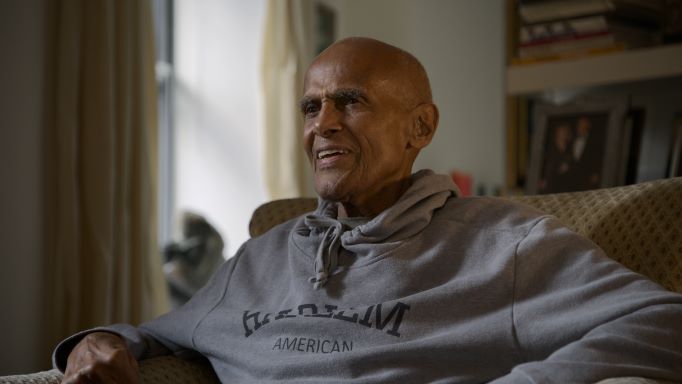![]() Critic, film historian, and now director Elvis Mitchell poses a question right at the start of his engaging lovefest/overview: Why did the surge of Black-centered films from the late 1960s through the 1970s fade away? Given the 135-minute running time, he makes short work in offering a solid answer. Nonetheless, what comes in between the question and answer is a lively look back that enhances the snappy clip compilation, loaded with films to add to your watch list or revisit.
Critic, film historian, and now director Elvis Mitchell poses a question right at the start of his engaging lovefest/overview: Why did the surge of Black-centered films from the late 1960s through the 1970s fade away? Given the 135-minute running time, he makes short work in offering a solid answer. Nonetheless, what comes in between the question and answer is a lively look back that enhances the snappy clip compilation, loaded with films to add to your watch list or revisit.
Actors Margaret Avery, Samuel L. Jackson, Zendaya (singing the praises of Diana Ross), screenwriter Suzanne De Passe, and many others join Mitchell in reliving and recalling this singular period of movie making. Mitchell, as narrator, speeds through film history: Black representation during the studio period, where racism rears its head in the unlikeliest places (Singin’ in the Rain); the pioneering filmmakers Oscar Micheaux and Alice Guy-Blaché (for her 1912 silent comedy, A Fool and His Money, featuring an all-Black cast); the divergent careers of stars Harry Belafonte and Sidney Poitier. His main point of interest begins in the mid-’60s with Nothing but a Man and A Man Called Adam. His focus then expands well beyond the so-called Blaxploitation genre. Yes, some of the usual suspects follow, the box-office hits Shaft and Super Fly, but also the higher brow Sounder and Lady Sings the Blues.
Most titles on his exhaustive list were independent productions. Although it’s not mentioned here, Hollywood studios were also part of the scene: Universal released The Bingo Long Traveling All-Stars & Motor Kings and Car Wash. While you get a sense of what these movies were about, this is no substitute for actually watching them. A minute of Melvin Van Peebles’s Sweet Sweetback Baadasssss Song barely hints at how wild and radical it is.
One excerpt also features in Nina Menkes’s recent takedown of the male gaze, Brainwashed: Sex-Camera-Power: the bubble bath scene from Super Fly, with actors Ron O’Neal and Sheila Frazier. Menkes scrutinizes it for how the camera fetishizes and lingers on the actress’s body. For a completely different approach to this sex scene, Mitchell interviews Frazier, and she comes across as bemused when she recounts how, when she first saw the movie on the big screen, she was surprised that when the camera panned over her body—au natural, bubbles and all—it was in slow motion.
Though Mitchell offers Pam Grier her due as a prolific action star, he glosses over how women were often portrayed during this era. Low-budget grindhouse filmmakers were likewise partial to throwing in gratuitous nudity at any opportunity—see the 2020 documentary Skin: A History of Nudity in the Movies—and it was women who had to bare all, more times than not. Perhaps needless to say, there is also no mention of other cringey moments: the homophobia in Blacula.
Alas, poor musicals. They took the blame for Hollywood’s troubles in the late ’60s with the box office disappointments of Camelot, Darling Lili, and Hello Dolly. Mitchell now points a finger to Sidney Lumet’s adaptation of the Broadway musical The Wiz as the probable culprit that brought the party to an end. True, it was a financial flop, yet it’s doubtful The Wiz was made for the same audience as, say, Shaft in Africa, and other factors are not considered. Some genres or trends have a short shelf life. Look no further than the disaster movies of the ’70s or, later on, the good ol’ boy action films of Burt Reynolds.
Moviegoing habits were also changing, and more theaters were moving to the suburbs. In my hometown of Albuquerque, NM, the single-screen State Theatre, located on the main downtown avenue, played Cleopatra Jones and the like before it closed in the mid-’70s as multiplexes sprouted uptown. These new theaters were dependent on studio films, and independent films, unless they were horror, were typically sidelined to two small art houses.
Is That Black Enough for You?!? will stream exclusively on Netflix, and many of the titles it spotlights will be brought to viewers’ attention for the first time, or at the very least, the documentary will whet appetites. Yet one wonders if any will be available on the platform, which has a spotty record, at best, with older films. Ironically, viewers can currently watch many these movies on Apple TV+. In some cases, film buffs will have to become detectives to track down the hard-to-find, like Three the Hard Way and Claudine, starring a great Diahann Carroll, who received a best actress Oscar nomination for this starring role.
Is That Black Enough for You?!? had its world premiere at the New York Film Festival and will begin streaming on November 11.

















Leave A Comment